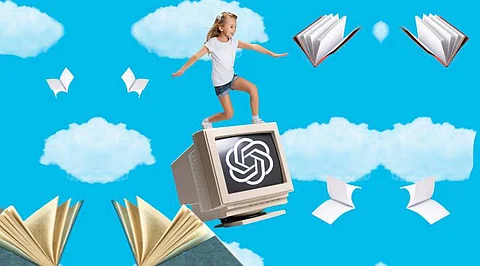

ChatGPT in the education sector is an emerging AI tool, developed by OpenAI. ChatGPT is an advanced language model for generating content, answering students' questions, and grading assignments as the demand for e-learning has grown. Thus, ChatGPT revolutionize the education sector with its ability to provide personalized and adaptive learning experiences to students.
ChatGPT is an advanced language model based on GPT-3.5 architecture. ChatGPT's advanced capabilities are used to create several educational applications that can transform students' traditional learning experiences and thereby make learning more accessible and effective. Especially, Natural Language Processing (NLP) capabilities allow to engage with students conversationally and provide instant feedback and support. ChatGPT benefits include personalized learning, language learning, assistance educators, instant feedback, and more. However, ChatGPT challenges are many to be addressed proactively to ensure equitable and effective learning outcomes. Let's look at the benefits and challenges of ChatGPT in the education sector in more detail:
ChatGPT helps create customized learning experiences for students based on interests, individual needs, learning styles, and skill levels for improved learning outcomes. It can help students to learn at their own pace and level of understanding. ChatGPT in turn provides customer feedback to enhance students' motivation and engagement.
ChatGPT provides sources of information and guidance for students as well as teachers and provides easier access to support when needed. Further, it helps make learning more accessible to students with disabilities which helps them achieve academic success.
Instant feedback is valuable in improving course material, facilities, and learning experience as a whole. ChatGPT helps students to identify their weak areas and work on them. It provides real-time feedback, saves time, and increases productivity.
ChatGPT is a valuable tool that helps generate ideas for assignments, lesson plans, and other activities that align with their objectives. It evaluates and improves the quality of written work. ChatGPT can also facilitate virtual classrooms. Teachers build interactive quizzes, games, and other engaging activities to enhance regular teaching approaches with the help of ChatGPT. Before implementing, teachers should have a firm grasp of ChatGPT's fundamentals.
ChatGPT help interacts with students and solves queries rapidly. It assists students after and before class and enhances the learning experiences which affects their outcomes. It helps students to develop critical thinking and problem-solving skills.
ChatGPT helps in language learning and provides translations, vocabulary practice, and grammar explanations to help students practice and improve their language skills.
ChatGPT, even though a valuable educational tool, is critical to understand that the technology has limitations and to use it in conjunction with other resources and tools to provide a comprehensive and well-rounded learning experience.
ChatGPT can collect and store data on the user. This raises concerns regarding privacy and security. ChatGPT should adhere to ethical and legal standards for data collection and storage. And ChatGPT should communicate with the user about the data that is being collected and how it is being used.
ChatGPT may also provide inaccurate incomplete information that leads to misunderstanding or confusion for both teachers and students.
Like any other AI technology, ChatGPT might also copy biases from the data trained on. This generates biased content that impacts both teaching and learning badly. The developer should ensure that the model is trained with different data sets and that it can actively mitigate against biases.
ChatGPT can process and generate ideas quickly, which might lead to the over-dependence of reliance on technology. It in turn reduces critical thinking, creativity, problem-solving, etc. Because it gives instant answers and solutions to students' problems leading to a decrease in their ability to think and create independently.
Many schools might not have the budget to implement ChatGPT to assist the student. ChatGPT education sector can be costly.
In short, looking at the challenges' of ChatGPT in the education sector, insufficient originality, plagiarism risk, and over-reliance on the technology are real concerns. This can be avoided with proper guidance and thus educators should be aware of these issues and enable safe and effective research while using ChatGPT. AI is incapable to engage in engaging critical thought to provide appropriate responses sometimes. ChatGPT has a huge potential in the future which has to be looked for by the users rather than only looking at the challenges.
Join our WhatsApp Channel to get the latest news, exclusives and videos on WhatsApp
_____________
Disclaimer: Analytics Insight does not provide financial advice or guidance. Also note that the cryptocurrencies mentioned/listed on the website could potentially be scams, i.e. designed to induce you to invest financial resources that may be lost forever and not be recoverable once investments are made. You are responsible for conducting your own research (DYOR) before making any investments. Read more here.
